

Alchemy on Pinterest. Jung and Buddhism. In the course of its introduction to European civilization, Buddhism has been interpreted by its Western translators in a wide variety of ways, ranging from wild distortions to increasingly accurate and subtle translations.
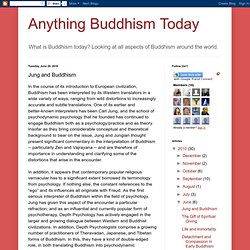
One of its earlier and better-known interpreters has been Carl Jung, and the school of psychodynamic psychology that he founded has continued to engage Buddhism both as a psychology/practice and as theory. Insofar as they bring considerable conceptual and theoretical background to bear on the issue, Jung and Jungian thought present significant commentary in the interpretation of Buddhism -- particularly Zen and Vajrayana -- and are therefore of importance in understanding and clarifying some of the distortions that arise in the encounter.
In addition, it appears that contemporary popular religious vernacular has to a significant extent borrowed its terminology from psychology. The Arcane Archive - View forum - The Main Rooms. Art Gallery & Web Services. Carl Jung and Tarot. Although many tarot practitioners apply a Jungian psychological approach to their tarot work, there’s been a question as to whether Jung himself knew anything about tarot.
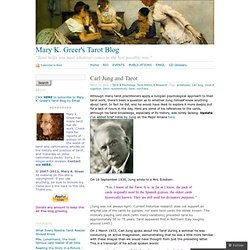
In fact he did, and he would have liked to explore it more deeply but for a lack of hours in the day. Here are some of his references to the cards, although his tarot knowledge, especially of its history, was sorely lacking. Update: I’ve added brief notes by Jung on the Major Arcana here. On 16 September 1930, Jung wrote to a Mrs. Index. November 2011. The One and the Many Gods.
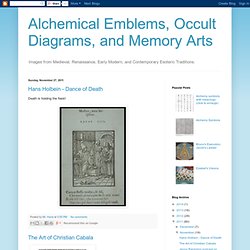
Marcion of Sinope. Apostle John (left) and Marcion of Sinope (right), from Morgan Library MS 748, 11th century Marcion of Sinope (Greek: Μαρκίων[1] Σινώπης), (c. 85 – c. 160) was the son of a bishop in early Christianity.
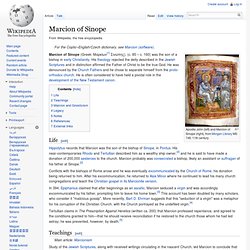
His theology rejected the deity described in the Jewish Scriptures and in distinction affirmed the Father of Christ to be the true God. He was denounced by the Church Fathers and he chose to separate himself from the proto-orthodox church. He is often considered to have held a pivotal role in the development of the New Testament canon. Life[edit] 4 Stories About Belief. By Gary Vey I'm going to tell you four stories that have something in common.
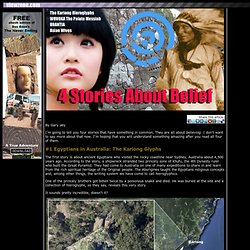
They are all about believing. I don't want to say more about that now. Psychology of Liber AL – pt.1: Introduction & First Principles. Introduction.
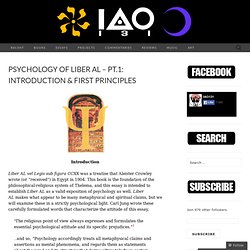
Massimo Marra - Alchimia, Ermetismo, Esoterismo occidentale, esoterismo. Basil Valentine. The Peterskirche, Erfurt, today.
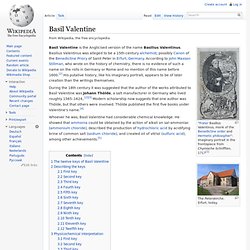
During the 18th century it was suggested that the author of the works attributed to Basil Valentine was Johann Thölde, a salt manufacturer in Germany who lived roughly 1565–1624,.[2][3] Modern scholarship now suggests that one author was Thölde, but that others were involved. Thölde published the first five books under Valentine's name.[4] Whoever he was, Basil Valentine had considerable chemical knowledge. <b>Alchemical Texts</b> - Alchemy Forums. Article from PHILOSOPHY PATHWAYS Issue 99. The Gospel of Jesus' Wife only proves our obsession with Mary Magdalene - National Gnosticism & Heretical Spirituality. The recently publicized Gospel of Jesus’ Wife has ignited a storm across academia and Christian communities alike.

The papyrus scrap, where Jesus mentions having a wife in one of many fragmented passages, resuscitated such hot-button, religious topics as celibacy, sexuality, women’s roles, and canonical supremacy versus apocryphal relevance (issues just as provocative in ancient times as today). List of death deities. Deities associated with death take many different forms, depending on the specific culture and religion being referenced.
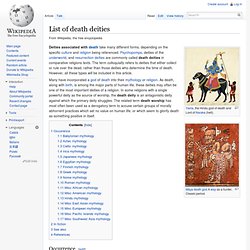
Psychopomps, deities of the underworld, and resurrection deities are commonly called death deities in comparative religions texts. The term colloquially refers to deities that either collect or rule over the dead, rather than those deities who determine the time of death. However, all these types will be included in this article. Many have incorporated a god of death into their mythology or religion. As death, along with birth, is among the major parts of human life, these deities may often be one of the most important deities of a religion.
Occurrence[edit] In polytheistic religions or mythologies which have a complex system of deities governing various natural phenomena and aspects of human life, it is common to have a deity who is assigned the function of presiding over death. Practical Alchemy. Article from PHILOSOPHY PATHWAYS Issue 99. Medieval Alchemists and Cannabis. Cannabis: The Philosopher’s Stone Part 4: Medieval Alchemists and Cannabis from Green Gold: the Tree of Life, Marijuana in Magic and Religion by Chris Bennett, Lynn Osburn, and Judy Osburn (published by Access Unlimited: openi420@juno.com) 1. 2. 3.
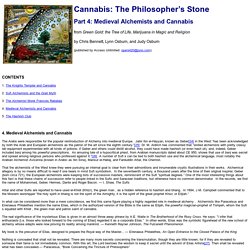
Alchemical Texts. The Vessels of Hermes – an Alchemical Album (ca.1700. Martin Rulandus-Lexicon of Alchemy (Lexicon Alchemiae 1612). The Hermetical Blog of Salazius D'Artigné. Article from PHILOSOPHY PATHWAYS Issue 99. René Schwaller de Lubicz. René Schwaller de Lubicz (1887–1961) is known to English readers primarily for his work in uncovering the spiritual and cosmological insights of ancient Egypt. Alchemy Magic and Kabbalah Foundation of the Works of CGJung - Content. Lilith. Lilith (Hebrew: לילית; lilit, or lilith) is a Hebrew name for a figure in Jewish mythology, developed earliest in the Babylonian Talmud, who is generally thought to be in part derived from a class of female demons Līlīṯu in Mesopotamian texts of Assyria and Babylonia. Evidence in later Jewish materials is plentiful, but little information has been found relating to the original Akkadian and Babylonian view of these demons. The relevance of two sources previously used to connect the Jewish Lilith to an Akkadian Lilitu—the Gilgamesh appendix and the Arslan Tash amulets—are now both disputed by recent scholarship.[1] The two problematic sources are discussed below.[2] The Hebrew term Lilith or "Lilit" (translated as "Night creatures", "night monster", "night hag", or "screech owl") first occurs in Isaiah 34:14, either singular or plural according to variations in the earliest manuscripts, though in a list of animals.
Etymology[edit] The Philosophers' Stone. Rex Research: Alchemy Index. Rexresearch.com Rex Research rexresearch.com PO Box 19250, Jean NV 89019 USA alchemy618@earthlink.net Alchemy & TransmutationNOTE : Due to hacker attacks focusing on large-size PDF downloads, those files now are directed to external links for downloads. The complete files are included on the Civilization Kit data dvd. Mithraism: Zoroastrian Gnosticism. The theory, originally proposed by Franz Cumont, that Mithraism evolved from Persian Zoroastrianism, is now generally dismissed. However, the theory has not been carefully examined. A primitive version of the Mithraic mysteries certainly existed among them, as can be determined from circumstantial evidence, where they contributed heavily to the Greek traditions of Orphism, which not only later emerged as prominent themes in Mithraism, but of Hellenistic mysticism in general.
While based on these earlier tradition, Mithraism nevertheless, modified during these times, to conform to these same Gnostic tendencies. The Magussaeans. Ever Dream This Man? Jakob Bohme. Rotten > Library > Biographies > Mad Science > Jakob Bohme. The Works of Jacob Boehme On-Line. Last Update: January 23, 2013. Principia Discordia - Index. Gnosticism. Movie Synchronicity 6: Robert Anton Wilson, UFO's and rabbits.
Religious Studies. Sufism, Sufis, and Sufi Orders: Sufism's Many Paths. Solve et Coagula: Mylius, Balthazar, and the Philosophia reformata « Unurthed. Hindu. Sex and The Bible, Part 1 - National Gnosticism & Heretical Spirituality. Knowing How to Listen. Details Written by Samael Aun Weor. Alchemy Library & E-Books. Christian Gnosis. Symbols in books of alchemy. Goddesses and Gods of the Ancient Egyptians: A Theological Encyclopedia. July 2010. Alchemy Journal Vol.5 No.4. Gnostic Teachings. The Gnostic World View: A Brief Summary of Gnosticism. Muraqaba. 9-2 (2003): Visualization in Medieval Alchemy. The Nature of Alchemy. Mutus Liber. Alchemy.
A complete version of The Gospel of Mary Magdalene - National Gnosticism & Heretical Spirituality. Jung's Theory of Temperaments. Chenrezig / Avalokiteshvara: Embodiment of Compassion in Tibetan Buddhism.